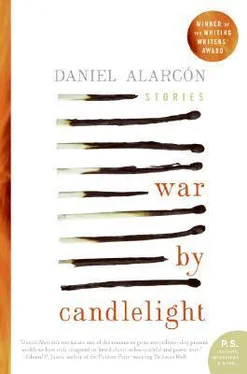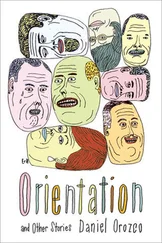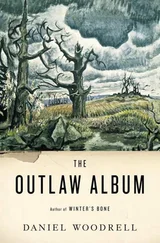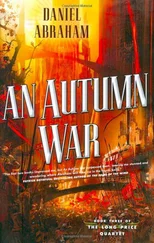Finally Elisa said, “Your mother’s not home, Chino.”
The streetlights had come on, and I noticed with some surprise that they crawled up the mountainside now. The neighborhood was still growing. New people arrived every day, as we once had, with bags and boxes and hopes, to construct a life in the city. We’d been lucky. Our new house had been small but well built. Everyone had welcomed us. Our street was overflowing with children, and within a week I’d forgotten about Pasco, about the friends I’d left there. My mother found work as a maid in San Borja, four days a week at the Azcárates’, a friendly couple with a son my age. Her employers were generous, kind, and understanding to a fault, especially after Don Hugo left us. They lent us money and helped pay for me to study when my old man abandoned that responsibility as well. They never kept her late — so where was she?
Elisa looked at me somewhat sheepishly. “You know, Chino, she’s been staying with la negra . With Carmela’s family, in La Victoria.”
“How long?”
“Since your father got sick, Chino.”
Elisa motioned for me not to leave while she sold a kilo of sugar to an elderly woman in a light-green dress. I’d rolled the newspaper into a tight baton. Now I tapped it against my thigh. I considered Elisa’s news, what it meant. The scope of my mother’s weakness, her astounding lack of pride. How could the arrangement work on either side, especially now, with the man who connected these two women dead? Carmela ran a dress shop, an enterprise she’d begun with my father’s investment. With my money probably, which should have been spent on my books, on my schooling. The business had succeeded, but was it enough, I wondered, to support the grief of two widows and three children — two of whom, at least, were still in school?
Elisa turned to me again as her customer shuffled down the street.
“Does she come here then? Ever?” I asked.
“Your mother? Sometimes. I saw her a few days ago. I don’t ask so much, you know. She’s embarrassed. She’s afraid of what you’ll think.”
“She knows exactly what I think.”
Elisa sighed. “She didn’t want you to know.”
“Then you shouldn’t have told me.”
Elisa leaned back against the metal gate in front of her store. “Oscar.”
“I’m sorry, vecina .” I looked down at my feet like a misbehaving child, and stamped out the prints of my sneakers in the dusty earth. “Anyway, thank you.”
“I’ll tell her you came by when I see her. Or you know, Chino, if you want you could—”
“Thank you, vecina .”
It was late. From my old street, I used to cut across the field behind the market, at any hour, fearlessly, but now it was an unnecessary hazard. The addicts would be out. In the firelight flicker of their ritual, I might have recognized an old friend, ashen, lost. I walked the long way out to the avenue.
I tried to picture my mother in her new home, sleeping on the guest bed or on a cot that she put away each morning. She and Carmela, sharing stories and tears, forgiving the old man in a nostalgic widows’ duet. What could they have in common? Carmela was Limeña , a businesswoman; she knew how the city worked. My mother had been just a girl when she met my old man, barely fifteen. In Lima, he had learned to dance salsa. To drink and smoke, to fight, fuck, and steal. My mother had learned none of this. She had waited for Hugo to come home and propose. Even now, she still had her mountain accent. For years she had known only one bus line—“the big green bus,” she called it — that took her to the Azcárates’ home. What could Carmela and my mother share besides a battleground? My mother had capitulated. It gave me vertigo. It was the kind of humiliation only a life like hers could prepare you for.
On Saturdays, when we first moved to the city, she would take me to the Azcárates house with her. We rode that big green bus, my mother tense, watching the streets pass in gray monotony, afraid of missing her stop. As a child and not an employee, I was able to cross certain lines. The Azcárates’ were permissive with me, and I never felt out of place in their home. I’d lay out my books on the table in the garden and do my homework, humming songs to myself. Sometimes their son, Sebastián, and I would wage war, setting up epic battles with swarms of plastic soldiers.
My mother liked everything about being in that house. She liked the order of it. She liked the plush of the golden brown carpet. She even liked the books, though she couldn’t read them, for the progress they represented. If I was bothering her in the kitchen, she always shooed me away: “Go grab a book, Chino. I’m busy right now.”
I was sitting with her in the kitchen one day when I asked her why we had moved. In the comfort of that kitchen, I knew that this was better than that , but the way my mother spoke of Pasco sometimes, one might picture a wide, fertile valley with temperate climate and warm people, instead of the poor and violent mining town it really was. Lima frightened her. She felt safe in exactly two places: our house and the Azcárates’ house.
“We had to move, Chino. Your father was here.” She was baking a cake and stirred the mix with a spatula. “Do you miss Pasco?”
I didn’t have to think about it. “No,” I said. “Do you miss it, Ma?”
“Of course,” she said.
“Why?”
Her face fell. “Your grandparents are there! I grew up there! Chino, how can you ask such a thing?”
“I don’t know,” I said, because I didn’t. She was a mystery to me, romanticizing the life we’d left behind. “It’s cold there.”
“If you lived away from me, wouldn’t you miss me?” she asked.
“Of course, Ma.”
“That’s how I feel.”
“Why don’t they come to Lima?” I asked.
“Ay, Chino, they’re too old. They wouldn’t like it here. Lima is too big. I’ll never get used to it.”
“Papi doesn’t miss Pasco.”
She smiled. Lima was his backyard, the place where he could become what he’d always imagined himself to be. “He’s different,” she said finally. “And you, Chino,” she added, “you’re just like your father.”
I sat on the Jirón, watching Lima pass by. A pedestrian mall of roast chicken joints and tattoo parlors, of stolen watches and burned CDs. Colonial buildings plastered over with billboards and advertisements. Jeans made at Gamarra to look like Levi’s; sneakers made in Llaoca to look like Adidas. A din of conversations and transactions: dollars for sale; slot machines; English tapes announcing, “ Mano” —pause, pause— “Hand.” Blind musicians singing songs. Pickpockets scoping tourists. The city inhaling.
I’d read my father’s short obituary over and over, read it against the other news of the day, looking for connections, for overlaps, for sense. The privilege of being a journalist, of knowing how close to the precipice we really were, hardly seemed worth it at times. The president seemed dazed and disoriented before the press. Ministers disappeared on midnight charters to Florida. Life moved. I watched a cop take a bribe in the privacy of a recessed doorway. A nun tried to pin a ribbon on me, for a donation. I dodged her with my most polite smile.
Then, from the Plaza San Martín, the whole world was running toward me, and past me on to the Plaza Mayor. Metal gates closed with clangs and crashes all along the Jirón. Business were shuttered with customers inside. The cop disappeared. I imagined the worst: a drunken mob of soccer fans wrecking and looting, raping and robbing. I ran to the end of the block and watched the people scatter. Then the Jirón was empty, and before me was one of the strangest things I’d ever seen.
Читать дальше












